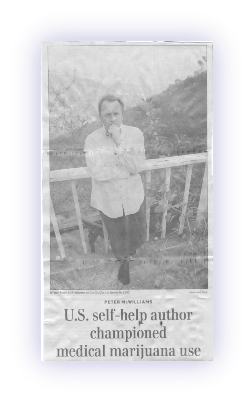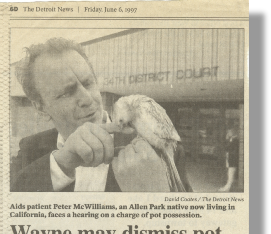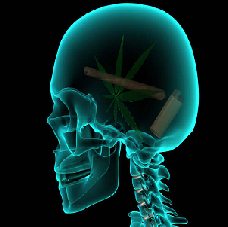

.org


Medical Marijuana & Me
By: Peter McWilliams
I began using medicinal marijuana in March, 1996. In that month I was diagnosed with both AIDS and non-Hodgkin's lymphoma, a result of the AIDS. The doctors who saved my life poured chemicals into me with side effects listed on twelve different sheets of paper with very tiny type I couldn't read without my putting on glasses. Nausea was a side effect of nearly every drug prescribed. The drugs that would save my life would need something to help keep them down. I was prescribed several anti-nausea medications, both oral and suppository.
I knew nausea was at the top of most marijuana-as-medicine lists, but I hesitated using it right away for two reasons. First, I found it hard to believe that to treat nausea modern medical science (all those test tubes and machines that go, "Ping!") didn't have something better than inhaling the smoke from dried marijuana flowers. I mean, these cute herbal remedies were fine in The Old Days, but I needed industrial-strength anti-nausea medication to combat the industrial-strength anticancer and anti AIDS medications. Or so I thought.

The second reason was psychological. For fifteen years I belonged to a religion that taught smoking marijuana was among the worst things you could possibly do to yourself physically, mentally, emotionally, morally, and spiritually. Although the religion I was in was hardly mainstream-closer to Heaven's Gate than Vatican City - I think this is a theme common in American religious teaching today. I had a religious-based prejudice against marijuana.
Fortunately, I had left the religion behind two years before my treatment began, but I still found pockets of well-instilled ignorance inside myself. I was willing to accept that my attitudes about marijuana were tucked away in one of those pockets. I decided to play writer-researcher and try everything my doctor said was okay to try and see what worked best while reading as much as I could about the possible dangers of marijuana.
One oral anti-nausea prescription medication did not seem to help at all. Marinol helped a little, but was of no use whatsoever in a nausea emergency. I stopped using Marinol for the specific reason that the protease inhibitor I was taking, Crixivan, required no fat intake for three hours prior to ingestion and Marinol capsules contain oil. (The active ingredient is suspended in vegetable oil.) I didn't want to take the chance of the oil in Marinol counteracting the AIDS-fighting effects of Crixivan.
The suppository was effective when I could hold it inside for twenty minutes. Sometimes I could do this, sometimes I could not. (I occasionally had mild diarrhea during my treatment. It is also - how do I put this delicately? - difficult to hold something in at one end when the body is trying very hard to expel something else out the other.) The suppository worked faster than the Marinol.
The smoked marijuana, however, worked faster than anything else. I would be trembling, sweating, on the verge of vomiting-fully resigned to vomiting, in fact-but within a minute of inhaling the marijuana, the symptoms eased. With a second puff, they disappeared completely. A third puff brought an unexpected sensation, one found with no other anti-nausea medication I tried: hunger. This was a most welcome side effects of marijuana and the sole reason I came out of chemotherapy and radiation therapy weighing more than when I went in.
Inhaling the smoke allowed me to perfectly and quickly adjust my dose, even thought the types of marijuana I used, due to black market fluxuations, had a broad range of strengths. The euphoric effect was most pleasant and, I think, therapeutic. Within a few weeks of regular (several times a day) usage I no longer had these blissful experiences. Although this swift acclimation to the more intoxicating effects of marijuana may be unhappy news to someone who wishes to be high all the time, it was good for me because, as a professional writer, I like having control of at least some portion of my brain when I write.
While I stopped getting "high" after a few weeks, I did find marijuana continued to have a soothing, calming effect physically, mentally, and emotionally. Physically, my body was a battle between the invading cancer cells and the chemicals sent to kill them. I was aware my personal Armageddon was being fought within. The overall feeling was as though my nerve endings, once round and plump, had now became shards of sharp steel. Marijuana removed this feeling completely and replaced it not with numbness or dullness but with ease and, sometimes, pleasure.
Mentally, cancer and AIDS found me financially not just out on a limb but dangling from a twig. "I'm hanging onto my lifestyle by my fingernails," I told friends. I had been defending myself against a mammoth lawsuit for two years which had completely drained my financial resources and borrowing capacity. Further, running my company with no money is much more difficult than running my company with money. Marijuana kept all this from swamping me while allowing me to keep a clear head for important decisions about both business and my health.
Emotionally I was not only faced with my own mortality but the reactions of my mother, brother, and best friend to my cancer and AIDS. Marijuana did not take away the many negative feelings natural at such a time, but it did remove the fear of feeling them. I could not take the pain away from my loved ones, but I think marijuana helped me listen more deeply. At least I never said, "There, there, it will be all right," during the time when it didn't look as though it would be all right at all.
 Indeed, marijuana led me to creative wellsprings within myself I had not visited
in years. I began using visual images as well as words to communicate. For hours
I sat in front of the computer playing with words and images, enthralled, entertained,
involved. Alive. While undergoing treatment, instead of lying in bed weak from nausea,
I learned the intricacies of two major computer programs to better express my visual-verbal
creations. I also wrote, designed, and self-published a book which became a New York
Times bestseller. (I say this not to brag, but to give lie to the notion that "heavy"
marijuana use leads to mental rot. In my case, the rot was there long before I started
using marijuana.)
Indeed, marijuana led me to creative wellsprings within myself I had not visited
in years. I began using visual images as well as words to communicate. For hours
I sat in front of the computer playing with words and images, enthralled, entertained,
involved. Alive. While undergoing treatment, instead of lying in bed weak from nausea,
I learned the intricacies of two major computer programs to better express my visual-verbal
creations. I also wrote, designed, and self-published a book which became a New York
Times bestseller. (I say this not to brag, but to give lie to the notion that "heavy"
marijuana use leads to mental rot. In my case, the rot was there long before I started
using marijuana.)
During my treatment I felt an enormous will to live because-even with the many external pressures-living was so much fun. I took chemotherapy and, later, radiation treatments in stride and still put in a full and enjoyable working (creative) day. I compare this to the attitude I would have had if each treatment and pill brought with it ever more nausea. I do not know how much importance the patient's attitude during treatment has on the outcome of that treatment, but thanks to medical marijuana my attitude was, "I want to live and thank you, medical professionals, for making that possible. Treat on!" Thanks to medicinal marijuana that was not just an affirmation, it was the way I really felt.
As to pain management, I had several occasions during treatment when treatment for specific pain was needed. I found that marijuana worked only moderately well on pain relief itself, but had the delightful ability to distract me from the pain by engrossing me in something else more enjoyable. A piece of the music, a bird, or a color would so enchant me it took my mind off the pain. This made marijuana an excellent adjunct, allowing me to use milder pain medications than I otherwise might have. For this kind of pain relief I had to smoke two-to-three times my normal anti-nausea dose.
For me, however, the big test (who knows? Maybe all this earlier stuff was psychosomatic) came when I got tested again after the chemotherapy treatment. One test involved injecting me with some sort of fluid which the outstandingly expensive machinery around me would trace through my body. When I received this injection the first time I was tested (pre-medical marijuana) I felt the most intense nausea I had ever felt in my life. Within a matter of seconds I vomited into the otherwise attractive stainless-steel crescent-shaped dish the nurse held. Here, the second time I was to receive this shot, would be marijuana's ultimate test.
I premedicated myself in the parking lot just before going in. The nurse, noting my reaction to the injection during the first test, was kind enough to ask if I wanted to take something for the nausea this time. I so hated the thought of having that feeling again that I almost said yes. But then I told myself (imagine Lou Grant as the voice of my writer's integrity), "If you ever want to write about medicinal marijuana, you'd better go through with this or else you'll never really know for sure." So I gulped and said, "No, but please keep handy the stainless-steel crescent-shaped dish."
Finally they injected me. Nothing. Not ever the slightest tinge of nausea. After the test, the nurse told me they used more tracer-fluid the second time than the first. I went to the nearest Burger King and ate a Whopper to celebrate.
As of this writing, August 1997, the cancer is in full remission and has less than a ten percent chance of recurrence. My viral load has been kept to near-undetectable levels for more than fifteen months by the combination of anti-virals and protease inhibitor, which I keep down with medicinal marijuana.
I owe my life to modern medical science and one ancient herb. I am currently awaiting trial in Michigan for possession of seven "marijuana cigarettes" for medical purposes. I had them with me on a trip to Detroit for my mother's birthday in December 1996. I face one year in prison if convicted.

| His Life |
| from the NY Times |
| past news |
| Buy Books from Us |
| Been There, Done that, Got Our T Shirt! |
| Oh Goody! Here's my Hoodie! |
| A Batch from the Past |
| Quotes |
| Poetry |
| Peter and Computers |
| Personal Growth |
| Luxury of a Negative Thought Main Page |
| How to Survive the Loss of a Love |
| Peter's Photography |
| Ain't Nobody's Business |
| LIFE 102 |
| Kodak Moment Quotes |
| Peter's Poems: Through the Years |
| Cards |
| Valentines |
| Handwritten Poetry |
| Journal Entries |
| Computer Articles |
| computer books |
| Computer Book Reviews |
| Newsweek Dec. 21, 1987 |
| TIME Magazine Jan. 24, 1983 |
| People Weekly Sept. 19, 1983 |
| Luxury Quotes |
| Excerpts from LIFE 102 |
| Author's Notes |
| Peter's Letter (Life 102) |
| Peter Trial: Latest News |
| Checklist for Depression |
| Peter Mail |
| Can't Use MMJ as Defense |
| Drug Laws Kill |
| I, Too, Have a Dream (August 3, 1998) |
| Libertarians Remember Peter |
| Pocono Libertarians Memorial |
| Peter in Action |
| Peter's Poetry |
| Radio Interviews |
| visits with our friends |
| Peter vs. John-Roger |
| Your Story |
| sharing stories |
| Contact Us |